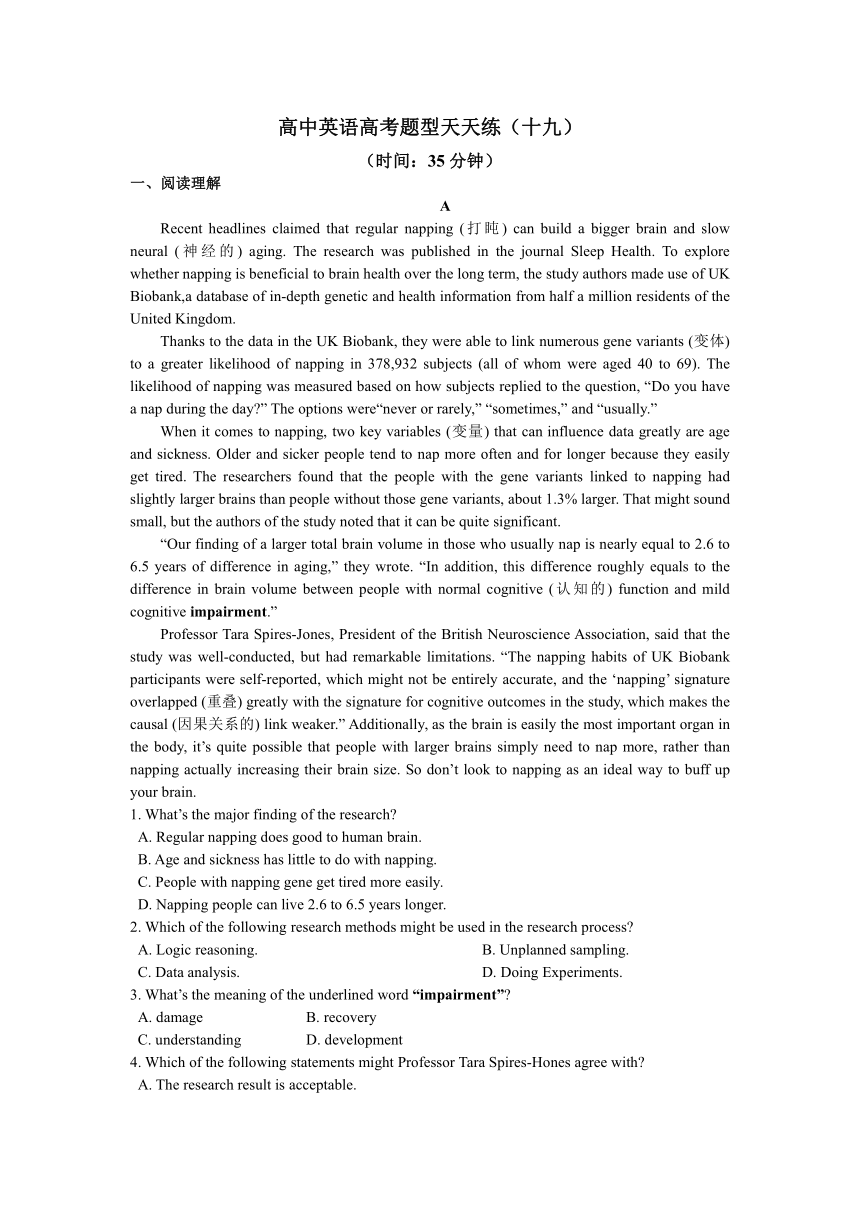
高中英语高考题型天天练(十九) (时间:35分钟) 一、阅读理解 A Recent headlines claimed that regular napping (打盹) can build a bigger brain and slow neural (神经的) aging. The research was published in the journal Sleep Health. To explore whether napping is beneficial to brain health over the long term, the study authors made use of UK Biobank,a database of in-depth genetic and health information from half a million residents of the United Kingdom. Thanks to the data in the UK Biobank, they were able to link numerous gene variants (变体) to a greater likelihood of napping in 378,932 subjects (all of whom were aged 40 to 69). The likelihood of napping was measured based on how subjects replied to the question, “Do you have a nap during the day ” The options were“never or rarely,” “sometimes,” and “usually.” When it comes to napping, two key variables (变量) that can influence data greatly are age and sickness. Older and sicker people tend to nap more often and for longer because they easily get tired. The researchers found that the people with the gene variants linked to napping had slightly larger brains than people without those gene variants, about 1.3% larger. That might sound small, but the authors of the study noted that it can be quite significant. “Our finding of a larger total brain volume in those who usually nap is nearly equal to 2.6 to 6.5 years of difference in aging,” they wrote. “In addition, this difference roughly equals to the difference in brain volume between people with normal cognitive (认知的) function and mild cognitive impairment.” Professor Tara Spires-Jones, President of the British Neuroscience Association, said that the study was well-conducted, but had remarkable limitations. “The napping habits of UK Biobank participants were self-reported, which might not be entirely accurate, and the ‘napping’ signature overlapped (重叠) greatly with the signature for cognitive outcomes in the study, which makes the causal (因果关系的) link weaker.” Additionally, as the brain is easily the most important organ in the body, it’s quite possible that people with larger brains simply need to nap more, rather than napping actually increasing their brain size. So don’t look to napping as an ideal way to buff up your brain. 1. What’s the major finding of the research A. Regular napping does good to human brain. B. Age and sickness has little to do with napping. C. People with napping gene get tired more easily. D. Napping people can live 2.6 to 6.5 years longer. 2. Which of the following research methods might be used in the research process A. Logic reasoning. B. Unplanned sampling. C. Data analysis. D. Doing Experiments. 3. What’s the meaning of the underlined word “impairment” A. damage B. recovery C. understanding D. development 4. Which of the following statements might Professor Tara Spires-Hones agree with A. The research result is acceptable. B. Napping boosts people’s brain size. C. The study shouldn’t h ... ...
~~ 您好,已阅读到文档的结尾了 ~~

